Enjoy the delicate dance of flavors and traditions at Sweets Making & Kimono Tea Ceremony in Gion Kiyomizu. The blend of sweet aromas and graceful movements sets the stage for a unique experience where past and present intertwine effortlessly.
As participants embark on this cultural journey, they uncover the intertwining threads of Japan’s culinary and sartorial heritage.
But what makes this activity truly special? Keep on to discover how this immersive encounter promises a delightful fusion of taste, elegance, and history, all wrapped up in a single enchanting event.
Just The Basics
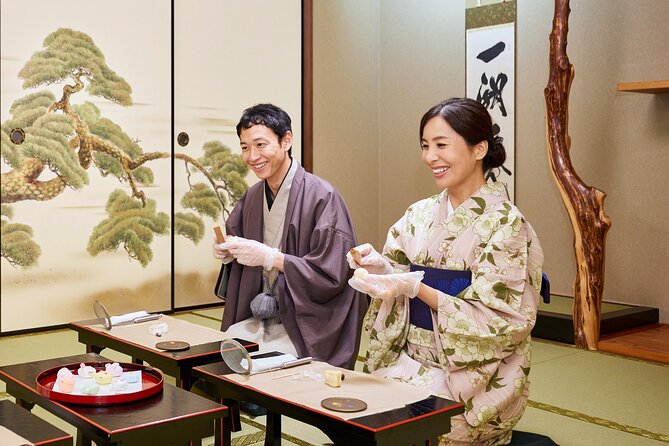
- Unique combination of Japanese sweets making and Kimono Tea Ceremony for a culture experience
- Hands-on session in Gion Kiyomizu to create traditional sweets and learn tea ceremony rituals
- Embrace traditional attire and etiquette while enjoying the grace and beauty of the cultural practices
- Memorable activity with sweet red bean paste, matcha powder, and tea brewing in a historic setting
Here's some other great tours and experiences nearby we think you'll like.
Event Overview
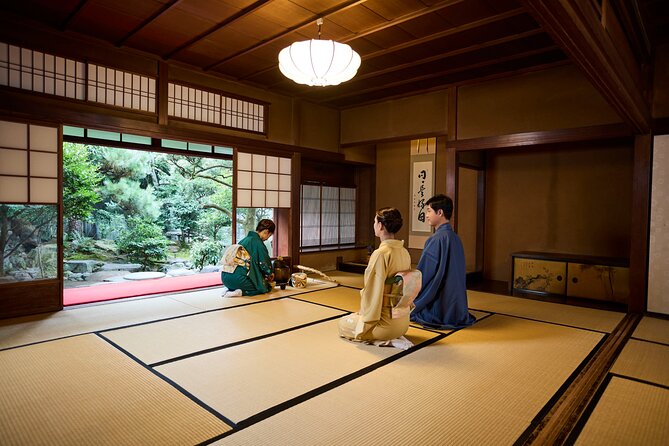
The event offers a unique experience combining Japanese sweets making and a traditional Kimono Tea Ceremony in the charming setting of Gion Kiyomizu. Participants get to engage in traditional activities and enjoy a cultural experience that’s both fun and educational.
This hands-on session allows visitors to learn the art of making Japanese sweets while also getting the chance to dress up in beautiful kimonos. The Kimono Tea Ceremony adds a touch of authenticity to the entire experience, making it a memorable and enriching activity.
Engaging in these cultural practices not only provides insight into Japanese traditions but also offers a delightful way to spend time in the historic district of Gion Kiyomizu.
Ingredients for Sweets Making
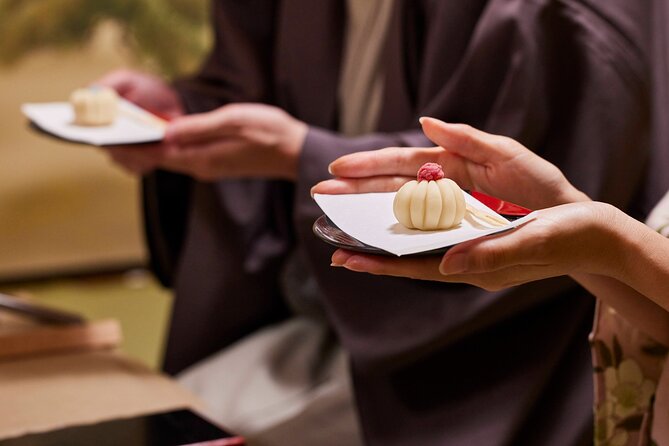
With the right ingredients at hand, anyone can master the art of Japanese sweets making during the Sweets Making & Kimono Tea Ceremony experience in Gion Kiyomizu. Japanese confectionery relies on key components like sweet red bean paste, glutinous rice flour, matcha powder, and agar-agar for that authentic taste.
These ingredients aren’t only essential for creating delicious treats but also reflect the cultural significance of traditional Japanese sweets. Participants are encouraged to don traditional attire, enhancing the immersive experience of crafting these delectable confections.
Kimono Tea Ceremony Details
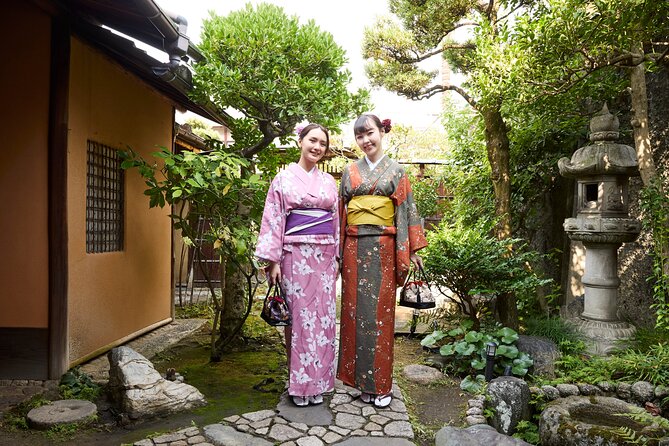
Now, let’s chat about what goes down during the Kimono Tea Ceremony in Gion Kiyomizu.
During this traditional tea ceremony, participants get to experience Japanese culture firsthand by wearing beautiful kimonos. Here’s what you can expect:
- Traditional Attire: Embrace the elegance of Japanese traditions by donning a gorgeous kimono.
- Cultural Experience: Enjoy the art of tea-making and the rituals that accompany it.
- Tea Brewing: Learn the intricate process of brewing and serving green tea with grace and precision.
- Etiquette: Discover the importance of manners and respect in Japanese tea ceremonies.
Get ready to sip on delicious tea while experiencing the grace and beauty of this ancient cultural practice.
Logistics and Meeting Point
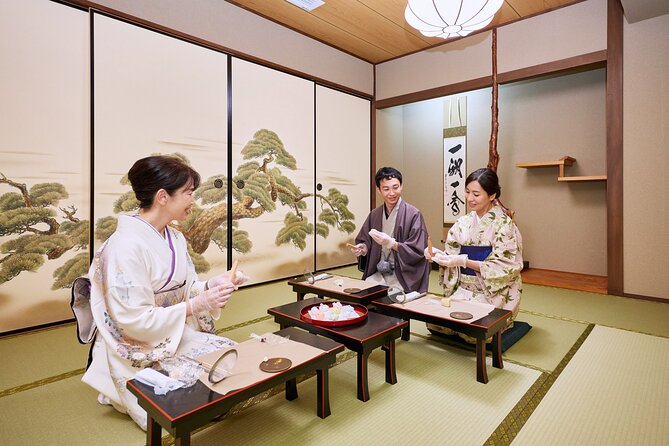
Meeting participants for the Sweets Making & Kimono Tea Ceremony in Gion Kiyomizu gather at the KIMONO TEA CEREMONY MAIKOYA at GION KIYOMIZU at 12:00 PM. The address is Kyoto, Higashiyama Ward, Matsubara-dori Yamtooji Higashi iru, 100-1, Kyoto City, Kyoto Prefecture, 605-0813, Japan. The activity ends back at the meeting point, so no need to worry about transportation after. Here’s a breakdown of the logistics details:
| Logistics Details | Meeting Point Specifics |
|---|---|
| Address | Kyoto, Higashiyama Ward, Matsubara-dori Yamtooji Higashi iru, 100-1, Kyoto City, Kyoto Prefecture, 605-0813, Japan |
| Start Time | 12:00 PM |
| End Point | Activity ends back at the meeting point |
| Additional Info | Confirmation received at booking, not wheelchair accessible, near public transportation, children under 7 not allowed in tea ceremony, maximum of 5 travelers on tour. |
Additional Information and Restrictions
For participants joining the Sweets Making & Kimono Tea Ceremony in Gion Kiyomizu, important information and restrictions to note include the confirmation received at booking, accessibility limitations, age restrictions for the tea ceremony, and the maximum number of travelers allowed on the tour.
- Dress code: Traditional kimono provided
- Cultural experience: Immersive hands-on activity
- Accessibility: Not wheelchair accessible
- Age restrictions: Children under 7 not allowed in tea ceremony
The tour offers a unique opportunity to engage in Japanese traditions, but it’s essential to bear in mind these considerations. Remember, only a maximum of 5 travelers can participate, ensuring an intimate and personalized experience. Get ready to dive into the world of sweets making and the art of the kimono tea ceremony in Gion Kiyomizu!
Cancellation Policy Details
Wondering about how cancellations work for the Sweets Making & Kimono Tea Ceremony in Gion Kiyomizu? If plans change, here’s the scoop on the refund process and reservation changes.
Need to cancel? No worries, you can get a full refund if you do so at least 24 hours before the start time. Just make sure to stick to the timeframe to secure your money back. However, if you cancel less than 24 hours before the activity kicks off, unfortunately, no refund will be possible.
Reviews, Pricing, and Support
When looking into this experience, travelers can expect a starting price of $81.03 and an overall rating of 5.0 based on 1 review, along with support available through the Viator Help Center.
- Customer Feedback: Get insights from past participants
- Booking Process: Easily reserve your spot for this cultural experience
- Cultural Experience: Enjoy local traditions
- Local Traditions: Learn the art of making Japanese sweets and participating in a traditional kimono tea ceremony
For any questions or assistance, travelers can reach out to the Viator Help Center.
This activity offers a budget-friendly way to engage with Kyoto’s rich cultural heritage.
Frequently Asked Questions
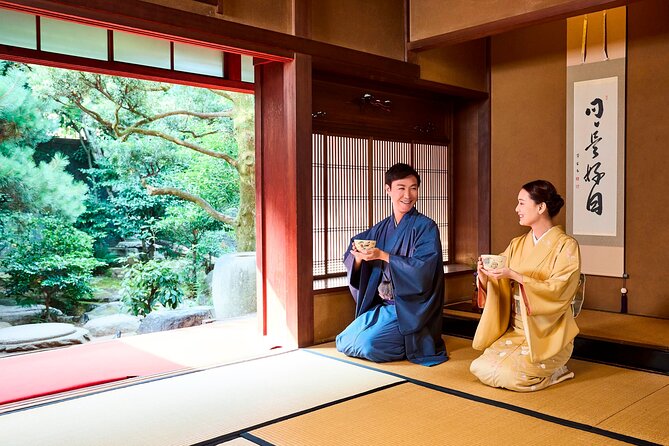
Can I Participate in the Tea Ceremony if I Have Dietary Restrictions or Allergies?
If one has dietary restrictions or allergies, alternative options and accommodations may be available for the tea ceremony. Ingredient substitutions or adaptations could be offered, ensuring a pleasant experience for all participants.
Is There a Minimum Age Requirement for Participating in the Sweets Making Activity?
For the sweets making activity, children under 7 are not allowed. An accompanying adult may need to supervise younger participants. It’s essential to check the specific age requirement before booking to ensure everyone can join in the fun.
Are There Restroom Facilities Available During the Experience?
Restroom access is available during the experience, and dietary accommodations can be arranged if needed. The participants can rest assured that these practical needs are taken care of to ensure a comfortable and enjoyable time.
Will There Be English-Speaking Guides or Assistants Available Throughout the Activity?
English-speaking guides or assistants will be available throughout the activity for culture. They ensure a seamless experience, providing insights and support. This service enhances understanding and enjoyment, making the tour engaging and informative for participants.
Can I Take Photos or Videos During the Sweets Making and Tea Ceremony?
Visitors can take photos during the activity to preserve memories, but should adhere to photography etiquette. Respect cultural norms and privacy concerns. Immerse in this unique cultural experience while capturing moments. Enjoy the tea ceremony and sweets making.
Final Words
To sum it up, Sweets Making & Kimono Tea Ceremony in Gion Kiyomizu offers a delightful way to learn about Japanese culture without breaking the bank.
With transportation and ingredients taken care of, all you have to do is show up and enjoy the experience.
Whether you’re a foodie, a history buff, or just looking for a unique activity, this event is sure to leave you with lasting memories of Japan’s rich traditions.
